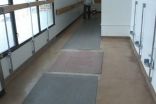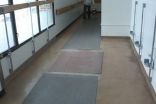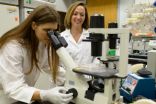(Press-News.org) This news release is available in French.
VIDEO:
Arthritis pain in dogs can be relieved, with no side effects, by a new product based on medicinal plants and dietary supplements that was developed at the University of Montreal's...
Click here for more information.
Arthritis pain in dogs can be relieved, with no side effects, by a new product based on medicinal plants and dietary supplements that was developed at the University of Montreal's Faculty of Veterinary Medicine. "While acupuncture and electrical stimulation are two approaches that have been shown to have positive effects on dogs, until now a few studies have investigated a plant-based approach to therapy," explained Professor Éric Troncy, senior author of the study. His findings were published in Research in Veterinary Science.
Troncy and his team worked with 32 dogs (and their owners!) who had been diagnosed with arthritis by X-ray and orthopaedic exam, and who all weighed more than 20 kilograms. By drawing on existing rodent studies and working with Pierre Haddad of the university's Department of Pharmacology, Troncy developed two formulas for his trial. These formulas are not currently commercially available.
The first formula, composed of curcumin, devil's claw, black current, Indian frankincense (Salai), willow bark, pineapple bromelaine and camomile, was developed to treat arthritis-induced inflammation. The second included the same ingredients, plus dietary supplements such as omega 3, chondroitin sulfate and glutamine, and was formulated in the hope that it would promote the regeneration of articulations.
Half the dogs received the first formula for four weeks and then the second formula for another four weeks. The other half, acting as the control, received a placebo. The outcomes were tested using three methods. Firstly, the dogs were filmed as they walked at a consistent speed over a special platform that captures the strength of each paw. Secondly, a special electronic collar recorded the dogs' daily activities. And finally, the owners were asked to provide their own evaluations of their dog's behaviour.
The researchers were able to identify an improvement by the fourth week of the trial.
"After the eight week course, on average, the strength of the dogs receiving treatment had improved to the equivalent of a kilo of extra strength per paw, which is moreover. None of these dogs saw their health decline, unlike 35.8% of the dogs who were given the placebo," said Maxim Moreau, who was first author of the study.
The improvements were also reflected in the dogs' daily lives. The collars revealed that the dogs receiving treatment maintained their physical activity, and in fact the group average increased from six hours of daily activity to eight. Meanwhile, the dogs receiving the placebo were progressively less active. "In some cases, we recorded the dogs to ensure that the collar was recording actual physical activity rather than movements such as scratching," Troncy explained.
Nonetheless, the ratings from the owners were more mixed. "This third evaluation was more subjective and the contrast between the test group and the control group less stark," Troncy said. "We suspect that the owner may have forgotten what the animal's behaviour was like before it developed arthritis."
The findings raise the possibility of offering a new form of treatment to human beings. "The model of evaluation that we have used is the best for predicting the efficacy of anti-arthritis treatments. We can therefore consider that clinical trials on humans would have a good chance of having positive outcomes," Troncy said.
INFORMATION:
About this study:
This study was funded in part by a grant from ArthroLab Inc., an ongoing New Opportunities Fund grant (#9483) and a Leader Opportunity Fund grant (#24601) from the Canada Foundation for Innovation for the pain/function equipment, a Discovery Grant (#327158-2008; #441651-2013) from the Natural Sciences and Engineering Research Council of Canada for the bio-analyses and salaries, and by the Osteoarthritis Chair of the University of Montreal Hospital Centre, Université de Montréal. Maxim Moreau received a doctoral scholarship from the Canadian Institutes of Health Research (TGF-53914) - Strategic Training Initiative in Health Research program (MENTOR) and a doctoral scholarship from the Fonds de recherche du Québec-Santé.
A team of researchers led by Michele Fumagalli from the Extragalactic Astronomy Group and the Institute for Computational Cosmology at Durham University, were among the first to use ESO's Multi Unit Spectroscopic Explorer (MUSE) instrument on the VLT. Observing ESO 137-001 -- a spiral galaxy 200 million light-years away in the southern constellation of Triangulum Australe (The Southern Triangle) -- they were able to get the best view so far of exactly what is happening to the galaxy as it hurtles into the Norma Cluster.
MUSE gives astronomers not just a picture, but provides ...
Dublin, Ireland, November 9th 2014 - Botanists at Trinity College Dublin have launched a database with information that documents significant 'life events' for nearly 600 plant species across the globe. They clubbed together with like-minded individuals working across five different continents to compile the huge database of plant life histories, for which data have been gathered over a near 50-year span.
At a time in which climate change and increasing human populations are rapidly re-shaping plant distributions, the researchers hope their COMPADRE Plant Matrix database ...
Bobbing your head, tapping your heel, or clapping along with the music is a natural response for most people, but what about those who can't keep a beat?
Researchers at McGill University and the University of Montreal, have discovered that beat-deafness, though very rare, is a problem not simply of how people feel a pulse or move their bodies, but instead, how people synchronize with sounds they hear.
"We examined beat tracking, the ability to find a regular pulse and move with it, in individuals who complained of difficulty following a beat in everyday activities ...
JACKSONVILLE, Fla. -- All patients with hepatitis C who receive a liver transplant will eventually infect their new livers. These transplanted organs then require anti-viral treatment before they become severely damaged. But traditional post-transplant hepatitis C therapy can take up to a year, is potentially toxic and can lead to organ rejection.
Now, at the American Association for the Study of Liver Diseases (The Liver Meeting® 2014) in Boston, researchers at Mayo Clinic report that use of two new oral medications post-transplant is safe and beneficial, and requires ...
Berlin, Germany (November, 2014) - Sweating, panting, moving to the shade, or taking a dip are all time-honored methods used by animals to cool down. The implicit goal of these adaptations is always to keep the brain from overheating. Now a new study shows that armor-plated dinosaurs (ankylosaurs) had the capacity to modify the temperature of the air they breathed in an exceptional way: by using their long, winding nasal passages as heat transfer devices.
Led by paleontologist Jason Bourke, a team of scientists at Ohio University used CT scans to document the anatomy ...
GAINESVILLE, Fla. -- Noroviruses are pernicious intestinal viruses. They cause violent vomiting and diarrhea, and people ill with the virus remain contagious up to three days after they seem to recover.
Although a vaccine for these viruses is in clinical trials, there is still no medication to combat them. That's in part because researchers have not been able to culture human noroviruses so they can test potential treatments -- until now, according to a study by University of Florida Health researchers published Friday, Nov. 7 in the journal Science.
UF Health researcher ...
In a new, in-depth research project, Queen's professors Rob Siemens (Urology) and Christopher Booth (Cancer Care and Epidemiology) investigated what affect higher volume hospitals and surgeons had on the outcomes of patients undergoing a radical cystectomy for bladder cancer in Ontario.
Using data provided by the Institute for Clinical Evaluative Sciences (ICES) the investigators studied 2,802 patients who underwent the procedure between 1994 and 2008 in Ontario and found that higher volume hospital and surgeons were associated with less post-operative complications and ...
BUFFALO, N.Y. -- Preschoolers whose parents have rules about what their children can and cannot eat have healthier eating habits than those raised without such rules, according to a new study by pediatrics researchers at the University at Buffalo.
The study also provides new information on how toddlers' ability to self-regulate, or control, their emotional and behavioral impulses influences their eating habits two years later, depending on the presence or absence of parental food rules.
The research is being presented on Nov. 7 at ObesityWeek 2014 in Boston. ObesityWeek ...
As if having a heart attack isn't bad enough, cardiologists know that the worst damage may actually occur after it's over.
Blocked arteries are typically the trigger, stopping the flow of blood and starving the heart muscle of oxygen. But when the blockage is removed and the blood comes rushing back, it wreaks havoc of its own. The result is called reperfusion injury, a life-threatening flood of inflammation and cellular destruction that has stumped scientists for 40 years.
Now, however, a potentially groundbreaking study by Fred Hutchinson Cancer Research Center scientists, ...
Seok Kang, associate professor in the UTSA Department of Communication, collaborated with Korean researcher Jaemin Jung to study the smartphone habits of college students in the United States and South Korea. The researchers were particularly interested in the type and amount of information college students from both countries disclose. The study was published in Computers in Human Behavior.
The two countries were selected due to the high rates of smartphone ownership among their young adults. Eighty percent of Americans own smartphones while the ownership rate in Korea ...







